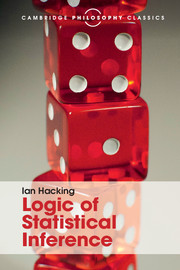Book contents
8 - Random sampling
Published online by Cambridge University Press: 05 July 2016
Summary
Many persons take inference from sample to population as the very type of all reasoning in statistics. It did lead to the naming of our discipline. ‘Statistics’ once meant that part of political science concerned with collecting and analysing facts about the state. ‘Statistical inference’ meant the mode of inference peculiar to that part of the science. The meaning has since been extended, but it is no verbal accident that ‘population’ is the name now given in statistics to a collection of distinct things which may be sampled.
What is the pattern of inference from sample to population? ‘Make a random sample of a population, assume in certain respects that it is typical of the whole, and infer that the proportion of E's in the whole population is about equal to the proportion in the sample.’ That would be the most naїve account. It is grossly inadequate, especially if the idea of a random sample were to remain undefined. In fact the process of inference from random sample to population is entirely rigorous. We must first attend neither to sample nor population, but to the sampling procedure. Any such procedure involves a chance set-up. Once the analysis of random sampling is complete, inference from sample to population follows as a trivial corollary of the theory of chance. In addition, most of the hoary riddles about randomness can be solved or else shown irrelevant to statistics.
Randomness
Three questions about randomness are to be distinguished, (1) What does the English word ‘random’ mean? Perhaps this can be answered briefly, but it would take 100 pages to prove any answer correct. I shall not try here. (2) What is the appropriate mathematical concept pertaining to infinite series, which is most similar to the ordinary conception of randomness? This problem has been definitively solved by Church, but we shall not require his results. (3) Which features of random samples are crucial to statistical inference? This is our question. We shall answer it in a sequence of distinct steps.
Random trials
It makes sense to describe trials on a set-up as random but in what follows I shall not do so because it is unnecessary. I take it that trials are called random if and only if they are independent. Hence it suffices to speak of independence.
- Type
- Chapter
- Information
- Logic of Statistical Inference , pp. 108 - 121Publisher: Cambridge University PressPrint publication year: 2016

